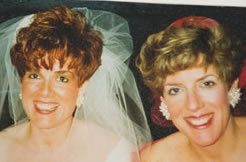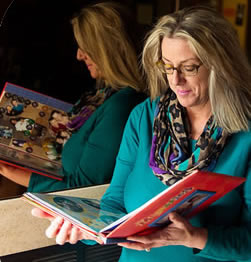Living Life at the End of Life


photo credit: Edda Pacifico
"I believe there is such a thing as a good death, and I know my sister had one,” says Ann Fitzsimons. “For some, completion of end-of-life activities is an important part of a cancer journey that can benefit both the patient and their loved ones."
Her sister, Maureen Neary Dooley, was only 44 when she was diagnosed with late-stage colorectal cancer. Fitzsimons became the champion who motivated her to do what was necessary and meaningful as she approached death.
"Cancer takes so much from people. Preparing for the end of their life on their terms, helps them regain some lost control," says Fitzsimons who is a member of the U-M Rogel Cancer Center’s Patient and Family Advisory Committee.
“You have to find the person who can complete the hard work with you and, importantly, without you, if you can't do it yourself. Your spouse or best friend may not yet have accepted this as the beginning of the end. So, you need to find someone who can help you do what you want and need to, just in case this doesn't turn out the way you're hoping it will."
With Fitzsimons' help, Dooley preplanned her funeral, set up trusts for her children and even prepared a family budget because she handled the money in the family.
"Doing these things helped her immensely," says Fitzsimons. "She needed to make sure that her family was well-cared for after she was gone."
Dooley also did a lot of legacy work, creating scrapbooks, videos, milestone cards and gifts for each of her three children and her husband. These projects provided a sense of purpose at a time when cancer can devalue a patient's self-worth. They also helped her realize she had lived a very full life.
Fitzsimons realizes her sister's death was exceptionally positive and many aren't able to plan and prepare so well. These conversations are difficult, and identifying what health care resources are available can be challenging. She advises asking the health care team for a palliative care consult to provide an extra layer of care for the patient and family. "You have to empower yourselves," she says, "and the earlier at the end-of-life, the better."
Rogel Cancer Center Chaplain Deacon Wayne Charlton says hospice is a marvelous resource. "So many people say, 'We took our mother to hospice and she died three days later,'" Charlton says. "Unfortunately, we often wait too long to get people into hospice. The sooner hospice is involved, the sooner the patient can be surrounded by friends and family in an environment built just for them."
Part of being prepared is having a Durable Power of Attorney for Healthcare and/or a Do-Not-Resuscitate (DNR) Declaration. Patients and families can get printed copies of the booklet and forms at a Michigan Medicine health center or clinic; any inpatient unit; the Guest Assistance Program, 800-888-9825; the Office of Clinical Safety, 877-285-7788 or download and print your own copy of at Start the Conversation: Making your health care wishes known.
Charlton also suggests that patients plan as much of their own funeral as they can, including readings and hymns. "Patients often tell me what wonderful emotions and experiences surfaced because of that."
"Maureen's last few days were nothing short of miraculous," Fitzsimons says. "She held court, and friends and coworkers came in with lunch. She was at peace and had no regrets as everything had been done. She had done the preparatory work and it had all been worth it."
Charlton says, "I encourage patients and families to continually look for the miracle but don't try to define it. In other words, if the only miracle we are looking for is the big one -- the one where there is a miraculous cure -- then we will most likely miss the other miracles that are unfolding before our very eyes, each and every day."
The U-M Rogel Cancer Center offers several services to support patients and families through their cancer journey to end of life.
Adult Palliative Medicine Program: 734-936-8357
Can be requested by patient or physician to assist in managing quality of life issues. Helps with physical and emotional issues as well as legal, faith and relationship matters.
Grief and Loss Program: 1-877-907-0859
Offers assistance for those experiencing loss related to cancer -- whether it is the patient’s personal loss or the family member's loss of a loved one. Visit the Grief and Loss website for more information.
Michigan Visiting Nurses
Palliative Care Services: 734-677-1515
A specialized program that emphasizes pain control and symptom management, and enables patients and families to continue to function in their homes for as long as possible.
Symptom Management and Supportive Care Program: 877-907-0859
Available to any Rogel Cancer Center patient at any stage in their treatment who is experiencing treatment- or cancer-related side effects, or dealing with transition of care due to advancing cancer. Visit the Symptom Management & Supportive Care Program website for more information.
Read the Winter 2015 issue of Thrive.
